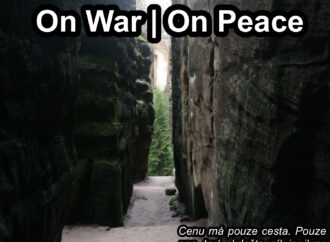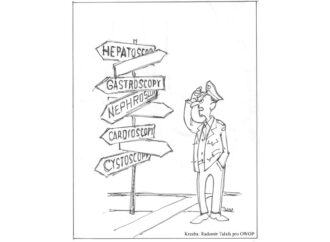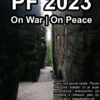This is the second piece on International Conference titled “NATO Strategic Concept: Response to Our Concerns?” organized by Prague Security Studies Institute.

Symbol of NATO, Brussels; Photo by NATO
The North Atlantic area has been recently occupied by the discussions on the new strategic concept. The third major doctrinal document after the end of the Cold War could easily become both, a relevant strategic document setting reasonable framework for NATO’s future functioning or an irrelevant quasi-strategic exercise resulting from the political and diplomatic compromises based on general acceptance of idea that almost whatever phenomena should be responded by the mightiest world security (defense?) organization. The process based on national group of experts defining national priorities could be considered as fairly democratic, however strongly implies a danger of resulting in the latter possibility.
Following a formerly theoretical and conceptual debate the word “securitization” has become commonly used in the policy and political circles. Even more than that, it has become terribly proliferated and over-used. Today, almost every aspect of the social environment has a security dimension and every phenomenon might have security implications (are not, after all, animal laws connected with the food security…?). As an inevitable result the word has become to a large extent analytically empty. It is, however, even more important for our discussion that it has produced a large spectrum of topics burdening a debate on a reasonable strategic framework for NATO.
The so called new threats (energy security, cyber security, migration, climate security,…) emanating from the reasoning mentioned above have been currently considered as relevant topics for the new NATO strategic conception. There is no doubt these phenomena create security concerns and should be also addressed accordingly. The key question, however, is by whom or better through what institutional frameworks.
In fact, these decisions have already been done, although the political representations have not appeared to reflect upon it. The problems of migration, climate security, food security, etc. are dealt with in various more or less focused international organizations often starting with the EU and UN agencies. These bodies are generally intermittently successful; however they have a much better prospect to be more efficient than NATO. The reasons could be summarized as follows:
- The impacts of the financial crisis will perhaps be greater than the politicians openly admit. This will create new tensions in already tensed defence budgets. New institutional capabilities (not to mention any other capabilities) are highly unrealistic within the NATO framework. The challenge for NATO will be to sustain current level of expeditionary missions;
- The experience from Afghanistan might influence a future shape of NATO; without necessarily speculating how, we can presume that highly probably negatively;
- The current international environment has provided a challenge in terms of achieving legitimacy for various actions. This pressure certainly influences also domestic political environment. For both reasons the functional expansion of NATO seems to be unrealistic.
Since the purpose of this comment is not only to offer a critique of political and strategic surrealism, I would suggest following three areas as substantial for the future NATO’s strategic framework.
- Retention and sustainability of the nuclear deterrence capabilities with all implications related to the article five.
- Evolution of functioning missile defence systems that, among other things, fit to NATO’s traditional hard security identity, second, provide protection against relevant threats, last but not least provide essential condition for future expeditionary mission when eliminating regional deterrence potentials.
- Create a more effective framework for special and rapid reaction forces, which provide a realistic tool of the future NATO’s actions.
Although I am not entirely optimistic, I still believe the new NATO strategic framework will become more than a list of member states’ security concerns. It is apparently easier to survive a few uncertain critical years with a clear and realistic strategic vision.
3 comments









3 Comments
Petr Z.
22. 1. 2010, 11:22I entirely agree with you that such NATO you proposed would be more focused and efficient, but I would argue that by looking only on NATO as institution you are missing out a key dimension in you analysis – the transatlantic relations. Why would the USA participate in this very narrowly defined organization, when US clearly do not need European capabilities to ensure basic levels of deterrence? In the case of Iran, NATO as a structure did not seem to be very helpful. I believe that US now prefers having NATO with counter-terrorist goals, which in my understanding is not included in your hard-security oriented NATO. And you can not simply ignore US needs, as the important organizational changes were usually forced by the US (e.g. out of area or out of business) The problem clearly is what precisely the counter-terrorist operations or measures would mean and what our participation with US should include.
REPLYIvo
22. 1. 2010, 22:34I could not agree more with the comment above.
In the previous article there was mentioned that „territorial defence is the lowest denominator of the NATO“. Without any shadow of doubt it is and it always was. On the other hand I can not see any clearly defined threat that territorial defence could cope with. The situation is radically different from the situation two decades ago. The current Russia can not be compared to the former USSR in its military capabilities nor its intentions. The problem with Russia’s expansion exists more in the heads of the eastern European NATO members than in reality.
Bottom line is: If the NATO switches its focus from the real threat which awaits us in the mountains of Middle East to the fictious threat posed by Russia to the eastern Europe it will lose all it purpose. You simply can not justify your existence by coping with the threats of the past.
p.s. Greetings to the land of the Red Dragon.
REPLYHonza Havránek
26. 1. 2010, 10:34I agree with you on the issues you outline in your conclusions. These are clearly the priorities that will bring NATO back on the track with regard to its original purpose.
„The so called new threats (energy security, cyber security, migration, climate security,…) emanating from the reasoning mentioned above have been currently considered as relevant topics for the new NATO strategic conception. There is no doubt these phenomena create security concerns and should be also addressed accordingly. The key question, however, is by whom or better through what institutional frameworks.“
This is an ever-green of the contemporary debate on security challenges. Are these relevant issues for NATO or not? I believe they are, simply because many NATO allies regard these phenomena as threats. This goes along with the opinion voiced at the conference you refer to in your contribution: NATO allies need to learn how to understand each other’s concerns and stop undermining the relations among themselves. Instead of labeling some fears as “fictious” (in Ivo’s words), NATO members should attempt to understand why some allies might see Russia, for example, as potential underminer of their stability and security. As Petr Z. suggests, what distinguishes NATO from other institutions is the unique setting that fosters the transatlantic relations and that has no parallel in other international organizations. This power is embedded in Article 4 and the instrument of consultations. Understanding the contemporary challenges – through active monitoring and consultations – will not weaken NATO. Whether it will improve the alliance’s readiness and preparedness to face these challenges will depend on concrete institutional processes that NATO yet needs to develop.
REPLY